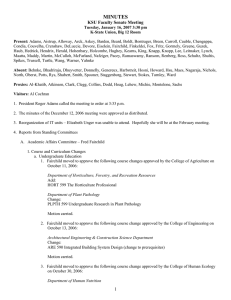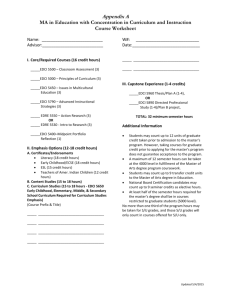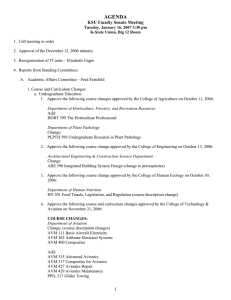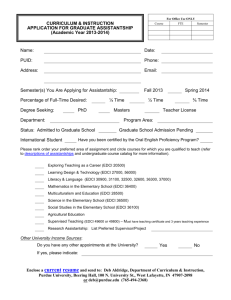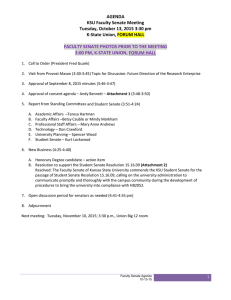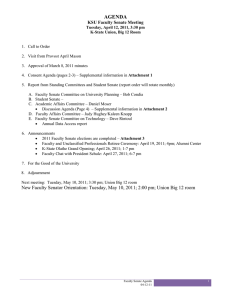MINUTES Faculty Senate Executive Committee
advertisement
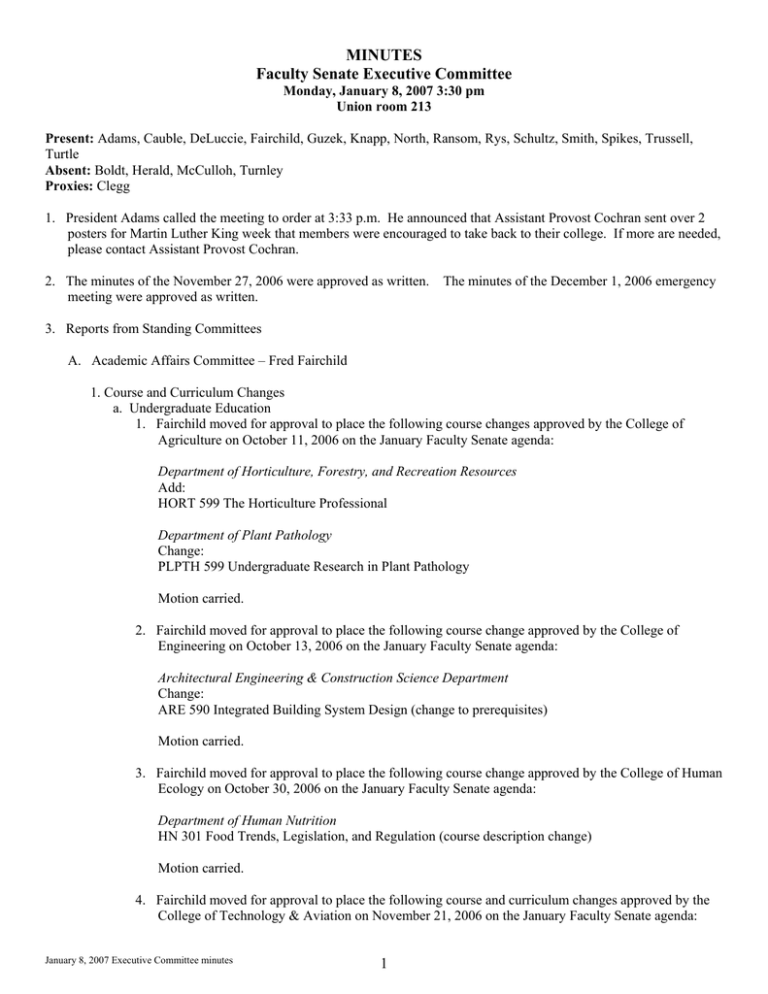
MINUTES Faculty Senate Executive Committee Monday, January 8, 2007 3:30 pm Union room 213 Present: Adams, Cauble, DeLuccie, Fairchild, Guzek, Knapp, North, Ransom, Rys, Schultz, Smith, Spikes, Trussell, Turtle Absent: Boldt, Herald, McCulloh, Turnley Proxies: Clegg 1. President Adams called the meeting to order at 3:33 p.m. He announced that Assistant Provost Cochran sent over 2 posters for Martin Luther King week that members were encouraged to take back to their college. If more are needed, please contact Assistant Provost Cochran. 2. The minutes of the November 27, 2006 were approved as written. meeting were approved as written. The minutes of the December 1, 2006 emergency 3. Reports from Standing Committees A. Academic Affairs Committee – Fred Fairchild 1. Course and Curriculum Changes a. Undergraduate Education 1. Fairchild moved for approval to place the following course changes approved by the College of Agriculture on October 11, 2006 on the January Faculty Senate agenda: Department of Horticulture, Forestry, and Recreation Resources Add: HORT 599 The Horticulture Professional Department of Plant Pathology Change: PLPTH 599 Undergraduate Research in Plant Pathology Motion carried. 2. Fairchild moved for approval to place the following course change approved by the College of Engineering on October 13, 2006 on the January Faculty Senate agenda: Architectural Engineering & Construction Science Department Change: ARE 590 Integrated Building System Design (change to prerequisites) Motion carried. 3. Fairchild moved for approval to place the following course change approved by the College of Human Ecology on October 30, 2006 on the January Faculty Senate agenda: Department of Human Nutrition HN 301 Food Trends, Legislation, and Regulation (course description change) Motion carried. 4. Fairchild moved for approval to place the following course and curriculum changes approved by the College of Technology & Aviation on November 21, 2006 on the January Faculty Senate agenda: January 8, 2007 Executive Committee minutes 1 COURSE CHANGES: Department of Aviation Change: (course description changes) AVM 111 Basic Aircraft Electricity AVM 162 Airframe Electrical Systems AVM 400 Composites Add: AVM 315 Advanced Avionics AVM 317 Composites for Avionics AVM 427 Avionics Repair AVM 429 Avionics Maintenance PPIL 217 Glider Towing CURRICULUM CHANGES Department of Aviation Add: Avionics Maintenance Certificate Program Purpose: This certificate program combines five existing aviation maintenance courses with four new avionics courses to meet the National Center for Aircraft Technician Training (NCATT) accredited training. It provides students the opportunity to attain the industry’s new Aviation Electronics Technician (AET) certificate. One new course, AVM 317, provides a focused introduction to composites specifically supporting avionics and was developed to facilitate delivery of the certificate to non-degree seeking students. Degree-seeking students gain this knowledge through the required course, AVM 400 Composites. The proposed certificate provides an aviation maintenance-based avionics program within the Department of Aviation. This certificate gives aviation students greater aviation elective options as well as providing a bridge from the airframe and powerplant certificate (APC) and aviation maintenance associate degree (AVM) into the aviation maintenance bachelor degree (AVMB). Additionally, engineering technology students in our college seeking an avionics education may pursue this certificate. Overall, this certificate gives students the educational basis and practical experience for placement in the rapidly growing avionics segment of the aviation maintenance industry which supports new technologically advanced aircraft (glass cockpits and advanced avionics). The certificate provides the means for our department to help meet the growing industry employee demand and follows the input provided by our in industry partners and our Aviation Advisory Board members. Most important of all, this provides our students with a better educational opportunity. Requirements: AVM 111 Basic Aircraft Electricity AVM 151 Aviation Maintenance Fundamentals AVM 162 Airframe Electrical Systems AVM 241 Navigational Aids and Communication Systems AVM 400 Composites or AVM 317 Composites for Avionics AVM 315 Advanced Avionics AVM 427 Avionics Repair AVM 429 Avionics Maintenance TOTAL: Motion carried. January 8, 2007 Executive Committee minutes 2 4 3 4 3 4 or 3 3 3 3 26/27 5. Fairchild moved for approval to place the following course and curriculum changes approved by the College of Education on November 28, 2006 on the January Faculty Senate agenda: Department of Elementary Education COURSE CHANGE From: EDEL 379 Elementary/Middle Level Physical Education Methods TO: EDEL 350 Health and Movement Education in Elementary Classrooms CURRICULUM CHANGE Remove FSHS 200 Sexuality and Health from the degree in elementary education. Total number of credit hours will go from 129 to 127. Rationale: The Kansas State Department of Education has changed the licensure standards in elementary education concerning health education, human movement, and physical activity. The previous standard included human sexuality but the new standard does not include this topic. Consequently, FSHS 200 Sexuality and Health can be dropped from the program; the health content from this course is being added to another existing required course. Motion carried. b. Graduate Education – Fairchild moved for approval to place the following course and curriculum changes approved by the Graduate Council on December 5, 2006 on the January Faculty Senate agenda: COURSE CHANGES: AGRON 762 Range Grasses AGRON 820 Plant Water Relations AGRON 830 Quantitative Genetics in Relation to Plant Breeding AGRON 893 Agricultural Simulation Modeling ASI 685 Stored Forage Systems for Ruminant Animals ASI 802 Gametes, Embryos, and Stem Cells in Farm Animals FDSCI 690 Principles of HACCP FDSCI 791 Advanced Application of HACCP Principles GRSC 902 Carbohydrates in Food PLPTH 730 Plant Nematology PLPTH 845 Plant Pathogenic Fungi KIN 600 Psychology of Physical Activity PHYS 651 Introduction to Optics GENBA 880 Business Strategy MANGT 860 Management of Legal, Ethical, and Public Policy Issues EDCI 816 Approaches to Reading Instruction EDCI 845 818 Theoretical Models of Reading EDCI 840 Literacy Assessment EDCI 841 Supporting Struggling Readers EDCI 847 945 Clinical Practicum in Reading EDCI 848 930 Leadership in Literacy ARE 690 Senior Project ARE 731 Advanced Lighting Design ARE 623 723 Timber Structures CIS 625 Concurrent Software Systems CIS 640 Software Testing Techniques CIS 748 Advanced Software Management EECE 725 Integrated Circuit Devices and Processes IMSE 889 Applied Methods in Industrial Engineering I HN 741 841 Consumer Response Evaluation January 8, 2007 Executive Committee minutes 3 CURRICULUM CHANGES: College of Agriculture (October 11, 2006 white sheets) 1) M.S. Agricultural Economics (Agribusiness Economics Option): FROM : Agribusiness Economics ECON 720 Microeconomics Theory AGEC 890 Adv Food & Agribusiness Mgmt AGEC 880 Agribusiness Industry Structures FINAN 815 Managerial Finance I Select one from either AGEC 805 Agricultural Marketing or AGEC 823 Agricultural Production Agribusiness Economics Total Credit Hours Total Coursework Hours Total Degree Credit Hours TO: Agribusiness Economics ECON 720 Microeconomics Theory AGEC 890 Adv Food & Agribusiness Mgmt AGEC 880 Agribusiness Industry Structures FINAN 815 Managerial Finance I 3 3 3 3 3 3 3 3 3 15 27 33 Agribusiness Economics Total Credit Hours Total Coursework Hours Total Degree Credit Hours 12 27 30 RATIONALE: Parallel degree program of MS in Agricultural Economics degree has 30 credits required, and to make this degree comparable, it is necessary to reduce the requirements by 3 credit hours. The courses that are least directly relevant to MS Agribusiness Economics student needs are AGEC 805 and AGEC 823. IMPACT: No impact on other departments. EFFECTIVE DATE: Fall 2007 2) Ph.D. Agricultural Economics: FROM: STAT 770 Theory of Statistics I TO: Choose 3 credit hours (1 course) from: STAT 770 Theory of Statistics I STAT 771 Theory of Statistics II ECON 890 Time Series Econometrics ECON 890 Microeconomics Panel Data conometrics 3 3 3 3 3 RATIONALE: STAT 770 is not designed for Ag Economics or Economics students. It is designed for and serves primarily Statistics graduate students. Many Ag Economics Ph.D. students do not have the mathematics prerequisite necessary to understand the material. The course has a rigorous probability orientation and more proof orientation than our students need. STAT 771 where inference and estimation are emphasized would be a better course for the students, but it has STAT 770 as a prerequisite. The ECON seminar courses will provide additional options for students. IMPACT: No impact on other departments. EFFECTIVE DATE: Fall 2007 College of Education 1) Doctor of Philosophy in Curriculum & Instruction (September 26, 2006 white sheets) DEPARTMENT OF CURRICULUUM & INSTRUCTION (ELEMENTARY AND SECONDARY) MINOR MODIFICATION: FROM: A minimum of 90 semester hours beyond the baccalaureate degree is required, including the following. (Up to 30 graduate hours earned as part of a master’s degree may be used to satisfy the following requirements, with the approval of the supervisory committee and January 8, 2007 Executive Committee minutes 4 TO: A minimum of 90 semester hours beyond the baccalaureate degree is required, including the following. Up to 30 hours of coursework may be accepted from a master’s degree and applied to the PhD program with the approval of the supervisory Graduate School.) committee. The nature of the courses and the length of time since master’s degree completion will be considered in accepting coursework within the guidelines of the Graduate School. Area of Emphasis (51 hours) Includes courses in the student’s area of specialty and any minor or elective area. Area of Emphasis (45 hours) Includes courses in the student’s area of specialty and any minor or elective area. Research Courses (9 hours) Includes research courses concerning methodology consistent with that required for the dissertation. Courses typically used to meet research expectations include: EDCEP 816 Research Methods EDCEP 817 Statistical Methods in Education EDCEP 917 Experimental Design in Educational Research Dissertation Research (30 hours) EDCI 999 Doctoral Research TOTAL: 90 hours Foundations of Education (3 hours) EDCI 886 Seminar: History/Philosophy of Education Or a foundations course approved by the supervisory committee. Research Courses (12 hours) EDCEP 816 Research Methods or its equivalent is considered a prerequisite for the 12 hours of research courses in the PhD program. Required Research Courses (9 hours) EDCEP 817 Statistical Methods in Education EDCEP 917 Experimental Design in Educational Research EDADL 838 Qualitative Research in Education Elective Research Course (3 hours) EDCEP 819 Survey Research EDADL 986 Seminar/Advanced Qualitative Methods Or any other research course taken from other disciplines at KSU and approved by the supervisory committee. Dissertation Research (30 hours) EDCI 999 Doctoral Research TOTAL: 90 hours Rationale: (1) Research Courses. To better prepare students to conduct their dissertation research and to be prepared for research responsibilities in their professional careers, more credits of research courses are required and three specific research courses are among the requirements. (2) Foundations of Education. The College of Education’s Conceptual Framework has a standard concerning foundations of education. A foundations of education course has been added to the degree requirements to ensure all students meet that standard. Effective Date: For students admitted to the PhD program on January 1, 2007 and later. 2) Reading Specialist Endorsement (October 24, 2006 white sheets) CURRENT CURRICULUM Required Courses (12 hours) a) EDCI 816 Approaches to Reading Instruction b) EDCI 840 Assessment in Reading/Language Arts c) EDCI 841 Individualized Reading and Writing Instruction d) EDCI 847 Clinical Practicum in Reading 3 3 Elective Course (3 hours) a) EDCI 715 Reading in the Content Areas b) EDCI 756 Tradebooks Across the Curriculum c) EDEL 758 Reading/Writing Connections d) EDCI 820 Contemporary Issues in Language Arts e) EDCI 878 The Language Arts Curriculum 3 3 3 3 3 January 8, 2007 Executive Committee minutes 3 3 PROPOSED CURRICULUM Required Courses (15 hours) EDCI 816 Approaches to Reading Instruction EDCI 818 Theoretical Models of Reading EDCI 840 Literacy Assessment 3 3 3 EDCI 841 Supporting Struggling Readers EDCI 930 Leadership in Literacy 3 3 Required Practicum (3 hours) EDCI 945 Clinical Practicum in Reading 3 Additional Requirements: After completing the required courses and practicum, the applicant must fulfill these additional requirements to obtain 5 a conditional reading specialist license. 1. Hold a valid professional teaching license 2. Present a score of 560 or above on the Praxis II exam for the Reading Specialist (test number 0300). 3. Hold a masters degree (It is permitted but not necessary to include the required courses as part of the masters degree.) TOTAL 15 Required Internship (4 hours) To be eligible to take the internship, the applicant must first complete the required courses and practicum and complete the additional requirements to obtain a conditional reading specialist license. Once the conditional reading specialist license is obtained, the applicant must enroll in 2 hours of internship per semester for one year as a full-time employee. EDCI 975 Internship in Reading 4 TOTAL 22 RATIONALE: The Kansas State Department of Education changed the licensure requirements for the reading specialist. The proposed curriculum includes an internship and other changes to bring our program in compliance with the new licensure requirements. EFFECTIVE DATE: For all students submitting the application for conditional reading specialist licensure on September 1, 2007 and beyond. College of Human Ecology (October 30, 2006 white sheets) 1) Master of Science Degree Report Option in Apparel and Textiles: Design Project Report RATIONALE: The proposed Design Project Report option will provide the M.S. student opportunity for advanced creative design of apparel and/or textiles that demonstrates the student’s synthesis of a defined problem or context. The Design Project Report option requires coursework and an approved project that results in written documentation and a body of original works for University exhibition and submission for juried review. The M.S. Design Project Report option requires a minimum of 30 graduate credits, including 2 Design Project Report credits (AT 896) and 4 Design Project Exhibit credits (AT 897). An oral examination that involves the defense of the project and the integration of concepts from coursework is also required. Currently, the department offers thesis and coursework options. These options do not provide the opportunity for development of comprehensive creative scholarship. As creative scholarship is practiced and supported in the department, the Design Project Report option will fulfill an unmet need, support a departmental focus area, and attract new students. EFFECTIVE DATE: Fall 2007 DROP: ASI 690 Principles of HACCP ASI 791 Advanced Application of HACCP Principles BIOL 862 Presentations in Ecology EDCI 717 Corrective Reading Instruction EDCI 825 Creative Language Expression EDCI 846 Diagnosis and Treatment of Reading Disabilities CIS 644 Object Oriented Design and Development NEW: BIOL 863 Professional Skills in Biology SPCH 756 Practicum in Conflict ASI 600 Applied Animal Biotechnology FDSCI 730 A Multidisciplinary Overview of Food Safety and Security FDSCI 840 Public Health Field Experience PLPTH 780 Spotted Microarray Workshop PLPTH 785 Real-Time PCR Workshop January 8, 2007 Executive Committee minutes 6 EDCI 975 Internship in Reading BAE 760 Environmental Engineering Seminar CE 866 Advanced Wastewater Treatment CIS 744 Advanced Software Analysis and Design IMSE 890 Applied Methods in Industrial Engineering II AT 805 Theory and Process in Creative Apparel and Textile Design AT 896 Design Project Report AT 897 Design Project Exhibit PREREQUISITE CHANGES (from prerequisites as listed to recommended prerequisites): AGRON 605 Soil and Environmental Chemistry AGRON 630 Crop Improvement & Biotechnology AGRON 635 Soil Conservation and Management AGRON 640 Cropping Systems AGRON 645 Soil Microbiology AGRON 655 Site Specific Agriculture AGRON 660 Range Research Techniques AGRON 681 Range Ecology AGRON 746 Physical Properties of Soils AGRON 790 Range Management Planning AGRON 816 Soil Physics AGRON 822 Herbicide Interactions AGRON 824 Advanced Weed Ecology AGRON 825 Soil and Plant Analysis AGRON 835 Nutrient Sources, Uptake and Cycling AGRON 840 Crop Physiology AGRON 855 Soil Organic Chemistry AGRON 860 Applied Plant Breeding AGRON 905 Advanced Soil Chemistry AGRON 925 Adv. Soil Genesis and Classification AGRON 945 Soil Mineralogy AGRON 950 Advanced Crop Ecology AGRON 955 Soil Microbial Ecology AGRON 970 Advanced Plant Breeding AGRON 980 Molecular Tools for Genetic Analysis Motion carried. c. General Education 1. Update – The following six courses have been removed by the colleges from General Education Status. This does not impact the courses being listed in the Undergraduate Catalog or in future schedules: Agriculture: PLPTH 300 Microbes, Plants, and the Human Perspective Architecture, Planning, and Design: LAR 720 Public Lands and Natural Resources Law Arts & Sciences: PHIL 175 Philosophical Composition Education: EDSEC 407 World Wide Web Based Searching/Resources EDSP 400 Introduction to Human Exceptionality Engineering: CHE 650 Hazardous Waste Engineering Seminar Fairchild moved to place this as an informational item on the January Faculty Senate agenda. Motion carried. January 8, 2007 Executive Committee minutes 7 2. Fairchild moved for approval to place the following course on the January Faculty Senate agenda for UGE status as approved by the UGE Council on December 11, 2006: DAS 355 – Introduction to Nonviolence Studies Motion carried. 2. Graduation additions – Fairchild moved for approval to place the following graduation additions on the January Faculty Senate agenda: August 2005 Susan Powell – Bachelor of Arts, College of Arts & Sciences May 2006 Michael Robert Matthews – Music Education, College of Arts & Sciences Motion carried. Fairchild reminded the committee there were a couple of curriculum items at the December Faculty Senate meeting that were sent back to the College of Engineering for clarification. Also, Melody Lehew will be on sabbatical during the spring semester and George Wang will be filling in for her. B. Faculty Affairs Committee – Betsy Cauble Cauble would like to add two items to the January Faculty Senate agenda. One is minor changes to the Ancillary Appointment language. The language is pending the action by the Faculty Affairs Committee meeting tomorrow. Ransom moved and Knapp seconded that the language will be put on the January Faculty Senate agenda for informational purposes to allow discussion. The vote will be taken at the February Faculty Senate meeting. Motion carried. Gary Leitnaker will be at their meeting tomorrow to discuss the option of the retirees who would not be eligible for Medicare when they retire. A meeting was held with the Attorney’s Office and other key personnel to discuss the Open Meetings Act. There are exclusions for General Grievance Board; however, these are different than one might think. Apparently, the exclusion language was not read completely through. Technically, we should have always been following the Open Meetings Act. Faculty Affairs will be working with Jane Rowlett to recommend revised language to our current procedure. There will be work on the language for the five year review of the Dean of Agriculture to insure that any archaic language does not cause problems. Members of the Faculty Salaries and Fringe Benefits and University Handbook and Policy committees will be at the January 23 meeting. There will be discussion of the report on the status of faculty salaries at Kansas State University. C. Faculty Senate Committee on University Planning – Tom Herald—no report. D. Faculty Senate Committee on Technology – Michael North Elizabeth Unger will be invited to the January Faculty Senate meeting to talk about the reorganization of the IT units. She was unable to come to the December meeting. North is asking FSCOT and IT for a policy change pertaining to disappearing, purged files. All traces of the file and the purging log will currently disappear in 30 days. After that, it is impossible to trace the file or what happened to it. All kinds of files can be quarantined and purged, not just email. Committee members were encouraged to informally talk to their caucuses about this issue. 4. Announcements A. Presidential announcements President Adams asked that members poll their caucuses about the change in the starting time for Faculty Senate meetings in 2007-2008 and 2008-2009 from 3:30 p.m. to 3:45 p.m. Due to room scheduling, the Big 12 room will not be available at the normal time. Please send any positive or negative feedback to President Adams Spikes. January 8, 2007 Executive Committee minutes 8 B. Faculty Senate Leadership Council—no report. C. Kansas Board of Regents Meeting – President Adams referred members to the attached report. D. Report from Student Senate—no report 5. New Business A. Faculty Senate Constitution — President Adams asked for thoughts on updating the Faculty Senate by-laws and constitution. Should a committee be formed to review the by-laws and constitution and make any necessary adjustments? It has been longer than five years since it has been reviewed and a few minor problems need to be cleaned up. At the next Executive Committee meeting members will be asked for a vote on whether to appoint a committee. 6. Old Business None. 7. For the Good of the University Spikes reminded us that as we are moving into the spring semester very quickly, he would like to have our help on the transition of leadership in Faculty Senate. How do we move across Senate years without having business “caught” in the transition? Please think about persons who can be approached for committee chairs. Spikes would also like us to start going back to the practice of having first readings (and sometimes second readings) that are done for informational purposes to enable the Senate to more smoothly work through issues that could have some challenges. Ortega mentioned that she will be sending out information about upcoming Faculty Senate elections. Cauble wanted to tell people that the upcoming Department Heads retreat tomorrow will focus on conflict resolution, which is a helpful topic for discussion. 8. Adjournment The meeting adjourned at 4:10 p.m. Next Meeting: January 29, 2007 3:30 p.m., 503 Hale Library January 8, 2007 Executive Committee minutes 9
